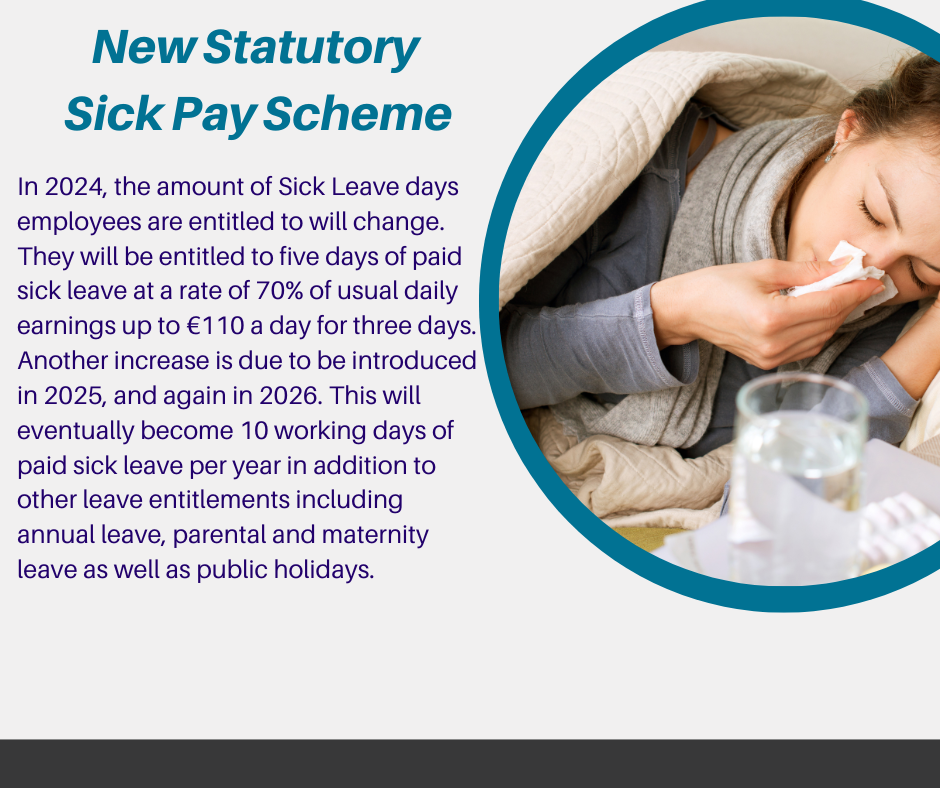The staggered roll-out has been designed to avoid placing an excessive financial burden on employers. It gives them time to plan and budget for the additional costs. As an employer, you must keep proper records for each employee. The records must be maintained for four years and include information in relation to each employee who availed of sick leave.
The following information must be included in the records:
An employer who fails to maintain accurate records may be convicted and subject to a fine of up to €2,500.
0 Comments
A first time Statutory Sick Pay entitlement for all employees moved closer to enactment with the announcement recently, by the Tánaiste and Minister for Enterprise, Trade and Employment Leo Varadkar TD, that the Government has approved the publication of the General Scheme of the Sick Leave Bill 2022.
The Bill legislates for a statutory sick pay scheme for all employees, phased in over a four-year period. The new scheme will start with three days per year once the Bill is enacted, rising to five days in 2024, seven days in 2025, and ten days in 2026. The timeline has shifted slightly since the Government first announced details of the proposed scheme last year when it said there would be 10 days of sick leave by 2025. Consumer rights in Ireland are set for significant reform. The proposed Consumer Rights Bill was published earlier this year for public consulta!on by the Department of Enterprise, Trade and Employment. The public consultation process completed on June 30, 2021 and submissions will be fully considered before the text of the Bill is finalised.
The Bill only applies to Business to Consumer (not B2B) transactions and is expected to include new statutory rights and remedies in contracts for digital content. It is also expected to contain: A company may operate a growth share scheme to incentivise their employees and managers. Growth shares are a special class of ordinary shares that generally have a low or nil value until a certain target is reached by the business. Conditions are specified by the employer when the shares are issued and may refer to:
An award of growth shares can be beneficial for:
From 2020 employers must report details of shares awarded on the Employers Share Awards return (Form ESA) for any year growth shares are awarded. Details of growth shares forfeited must be reported under the relevant columns of the Forfeitable Shares section of the Form ESA in the return year when they are forfeited. Form ESA 2020 was due to be filed by 31 August 2021. For subsequent years the reporting date of 31 March following the relevant tax year will apply. The return must be completed offline and then uploaded to Revenue Online Service (ROS) . The Employment (Miscellaneous Provisions) Act, 2018 has updated the Organisation of Working Time Act to provide employees with a statutory entitlement to a “banded hours” contract in certain circumstances. It is contractual entitlement for employees to work within a set range of hours for the next 12 months, calculated by averaging out the hours worked during the previous 12 months.
There are certain sectors in which experience shows that employees’ contracts do not reflect the hours actually worked. By way of example, the hospitality sector would historically be seasonal in nature with employees potentially working full time during busy summer months, with limited hours during the winter months. Over the years, and prior to Covid, the “season” extended, and regularly employees would work full time on a year-round basis, but hold a contract requiring working hours at a much lower level. |
Archives
June 2023
Categories
All
|
-

Business to Business
Providing Step by Step Guidance
Get in touch for your free consulation today
Contact Us -

-

Over 30 Years Experience
Insight into all aspects and types of business
Get in touch for your free consulation today
Contact Us
We create custom business to business strategies. |
SITE MAP |
CONTACT DETAILS
|
|
©
2024 Ryan & Crowley Chartered Accountants


 RSS Feed
RSS Feed

